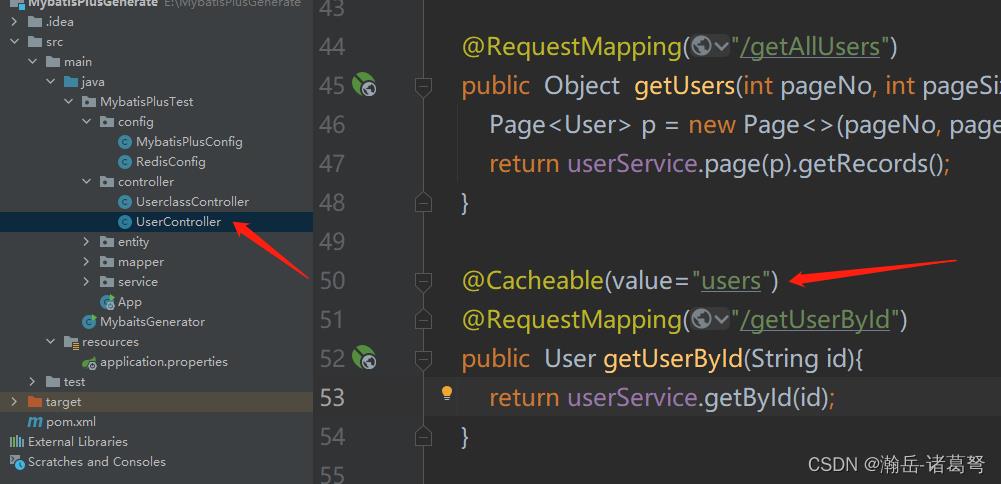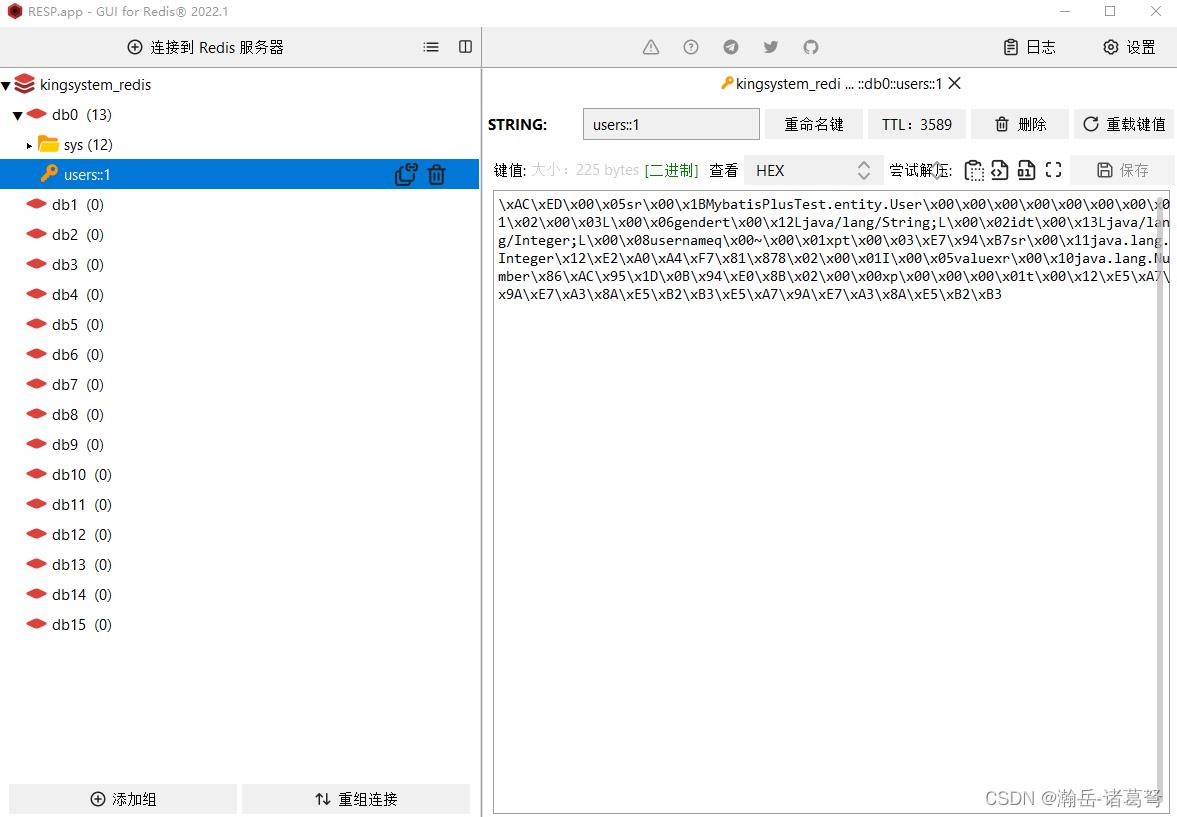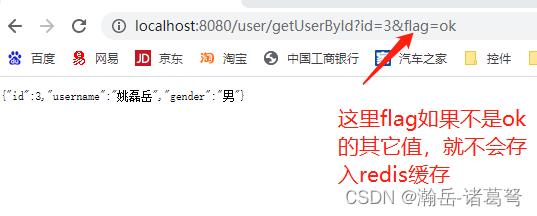SpringBoot+Maven+MyBaitsPlus+MySQL+Redis——配置开启Redis的基本使用
Posted 瀚岳-诸葛弩
tags:
篇首语:本文由小常识网(cha138.com)小编为大家整理,主要介绍了SpringBoot+Maven+MyBaitsPlus+MySQL+Redis——配置开启Redis的基本使用相关的知识,希望对你有一定的参考价值。
1、前置知识
(1)MybatisPlus操作数据库与代码生成:有道云笔记
2、安装RDIS监控软件:RedisDesktopManager
3、引入pom.xml引入依赖
<dependency>
<groupId>org.springframework.boot</groupId>
<artifactId>spring-boot-starter-data-redis</artifactId>
</dependency>
<dependency>
<groupId>redis.clients</groupId>
<artifactId>jedis</artifactId>
<version>4.2.2</version>
</dependency>
<dependency>
<groupId>org.apache.commons</groupId>
<artifactId>commons-lang3</artifactId>
</dependency>4、在config文件夹中创建RedisConfig,如下文件:
package MybatisPlusTest.config;
import com.fasterxml.jackson.annotation.JsonAutoDetect;
import com.fasterxml.jackson.annotation.PropertyAccessor;
import com.fasterxml.jackson.databind.ObjectMapper;
import org.springframework.cache.CacheManager;
import org.springframework.cache.annotation.CachingConfigurerSupport;
import org.springframework.cache.annotation.EnableCaching;
import org.springframework.context.annotation.Bean;
import org.springframework.context.annotation.Configuration;
import org.springframework.data.redis.cache.RedisCacheConfiguration;
import org.springframework.data.redis.cache.RedisCacheManager;
import org.springframework.data.redis.cache.RedisCacheWriter;
import org.springframework.data.redis.connection.RedisConnectionFactory;
import org.springframework.data.redis.connection.lettuce.LettuceConnectionFactory;
import org.springframework.data.redis.core.*;
import org.springframework.data.redis.serializer.GenericJackson2JsonRedisSerializer;
import org.springframework.data.redis.serializer.Jackson2JsonRedisSerializer;
import org.springframework.data.redis.serializer.StringRedisSerializer;
import java.time.Duration;
@Configuration
@EnableCaching
public class RedisConfig extends CachingConfigurerSupport
/**
* 选择redis作为默认缓存工具
* @param redisConnectionFactory
* @return
*/
/*@Bean
//springboot 1.xx
public CacheManager cacheManager(RedisTemplate redisTemplate)
RedisCacheManager rcm = new RedisCacheManager(redisTemplate);
return rcm;
*/
@Bean
// public CacheManager cacheManager(RedisConnectionFactory redisConnectionFactory)
// RedisCacheConfiguration redisCacheConfiguration = RedisCacheConfiguration.defaultCacheConfig()
// .entryTtl(Duration.ofHours(1)); // 设置缓存有效期一小时
// return RedisCacheManager
// .builder(RedisCacheWriter.nonLockingRedisCacheWriter(redisConnectionFactory))
// .cacheDefaults(redisCacheConfiguration).build();
//
public RedisCacheManager redisCacheManager(LettuceConnectionFactory lettuceConnectionFactory)
return RedisCacheManager.builder(lettuceConnectionFactory)
.cacheDefaults(RedisCacheConfiguration.defaultCacheConfig(Thread.currentThread().getContextClassLoader()))
.build();
/**
* retemplate相关配置
* @param factory
* @return
*/
@Bean
public RedisTemplate<String, Object> redisTemplate(RedisConnectionFactory factory)
RedisTemplate<String, Object> template = new RedisTemplate<>();
// 配置连接工厂
template.setConnectionFactory(factory);
//使用Jackson2JsonRedisSerializer来序列化和反序列化redis的value值(默认使用JDK的序列化方式)
Jackson2JsonRedisSerializer jacksonSeial = new Jackson2JsonRedisSerializer(Object.class);
ObjectMapper om = new ObjectMapper();
// 指定要序列化的域,field,get和set,以及修饰符范围,ANY是都有包括private和public
om.setVisibility(PropertyAccessor.ALL, JsonAutoDetect.Visibility.ANY);
// 指定序列化输入的类型,类必须是非final修饰的,final修饰的类,比如String,Integer等会跑出异常
om.enableDefaultTyping(ObjectMapper.DefaultTyping.NON_FINAL);
jacksonSeial.setObjectMapper(om);
// 值采用json序列化
template.setValueSerializer(jacksonSeial);
//使用StringRedisSerializer来序列化和反序列化redis的key值
template.setKeySerializer(new StringRedisSerializer());
// 设置hash key 和value序列化模式
template.setHashKeySerializer(new StringRedisSerializer());
template.setHashValueSerializer(jacksonSeial);
template.afterPropertiesSet();
return template;
/**
* 对hash类型的数据操作
*
* @param redisTemplate
* @return
*/
@Bean
public HashOperations<String, String, Object> hashOperations(RedisTemplate<String, Object> redisTemplate)
return redisTemplate.opsForHash();
/**
* 对redis字符串类型数据操作
*
* @param redisTemplate
* @return
*/
@Bean
public ValueOperations<String, Object> valueOperations(RedisTemplate<String, Object> redisTemplate)
return redisTemplate.opsForValue();
/**
* 对链表类型的数据操作
*
* @param redisTemplate
* @return
*/
@Bean
public ListOperations<String, Object> listOperations(RedisTemplate<String, Object> redisTemplate)
return redisTemplate.opsForList();
/**
* 对无序集合类型的数据操作
*
* @param redisTemplate
* @return
*/
@Bean
public SetOperations<String, Object> setOperations(RedisTemplate<String, Object> redisTemplate)
return redisTemplate.opsForSet();
/**
* 对有序集合类型的数据操作
*
* @param redisTemplate
* @return
*/
@Bean
public ZSetOperations<String, Object> zSetOperations(RedisTemplate<String, Object> redisTemplate)
return redisTemplate.opsForZSet();
注意:
(1)如果爆红,先确定pom.xml引用依赖后,是否reload完成了。
(2)上面config文件的代码,可以暂时不用去了解每一个内容做什么,先配置完成。
5、Redis测试:
(1)在controller做注解,@Cacheable

(2)看是否正确存入到Redis缓存。正确存入Redis结果如下图:

注意:这里本人在使用时碰到了一个类转换的问题。根据下面这个博客内容debug通过:
spring boot 使用redis作为cache 出现:A cannot be cast to A.使用fastJson序列化 - 简书
6、关于注解@Cacheable的详细说明

其中:
(1)value:指明所返回的结果被存储与Redis的什么地方,文中代码对应如下图:

(2)key:这里指定为id,如果id都在redis当中有,则直接从缓存返回值,如果id不存在的话,则执行getuserById方法,从数据库获取。以上图为例:当id=1或2时,直接从缓存返回。其它则第一次从数据库取,其它批次从缓存取。
(3)condition:根据条件,判断结果是否存入缓存。如下图所示:

本文例子是将@Cacheable注解写在controller层,这仅为展示需要,真实项目开发过程中,应该放到service层,避免重复代码。网上有的说放到controller层更加灵活,其实完全没有必要,所有的数据都缓存,冗余一点个人感觉没什么关系。
本文完整代码:
以上是关于SpringBoot+Maven+MyBaitsPlus+MySQL+Redis——配置开启Redis的基本使用的主要内容,如果未能解决你的问题,请参考以下文章